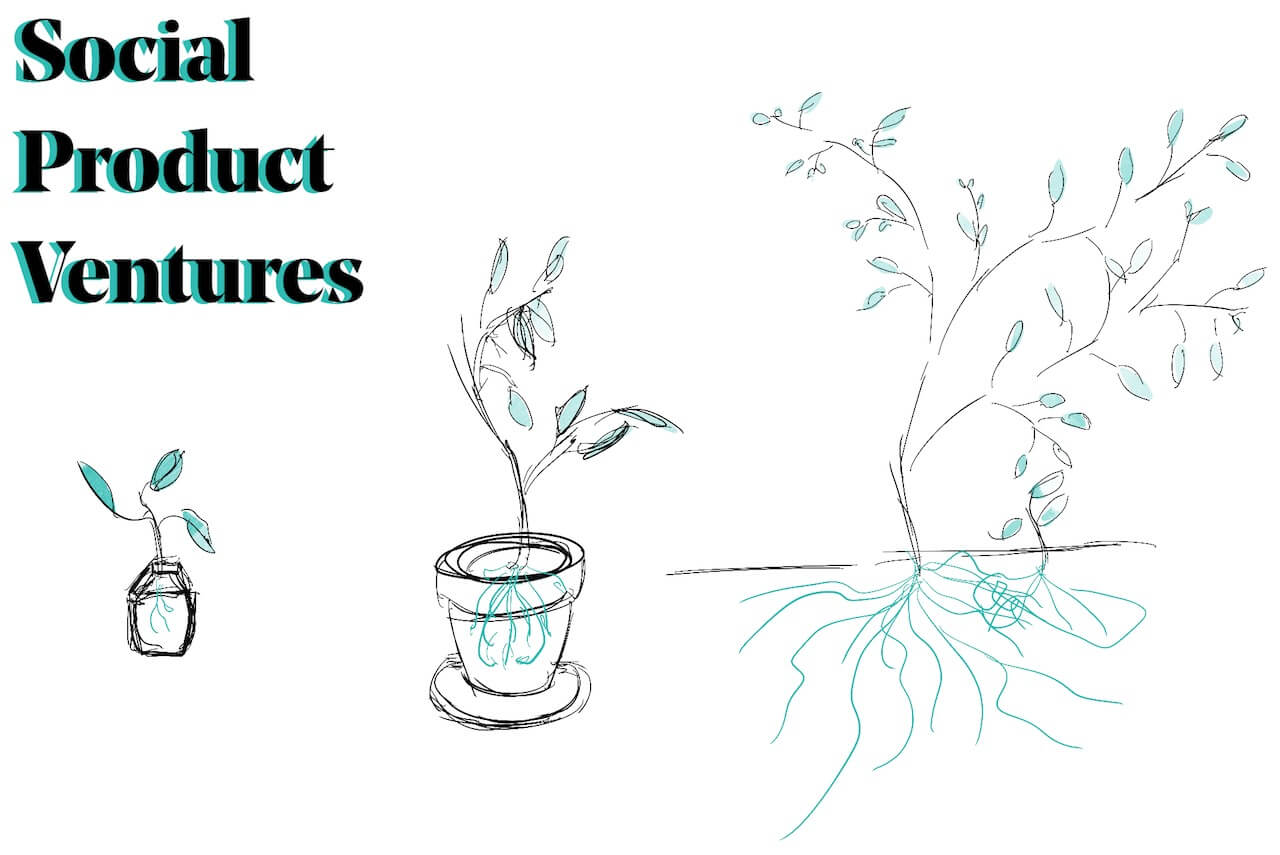Social Product Ventures

A Social Product Venture is a business created around a product or service that measurably supports positive social outcomes. Examples of these outcomes might be a net increase in the number of at-risk students successfully graduating, or quarterly reductions in recidivism for those exiting the criminal justice system. These outcomes/bottom lines are declared somewhere in the business structure, such as a B Corp’s certification or a Washington State Social Purpose Corporation1. Additionally, the organizational structure of the venture reflects and incentivizes the mission towards these outcomes: it might be reflected in the design of its board, or in financial incentives for team members around bonuses, or in the way the team hires and trains its product teams.
I think that the social product venture can resemble a traditional product venture in many ways. It might still be “for profit” in nature; it might still seek high growth venture funding; it might still be bootstrapped with a goal of being self-sustaining for the founders; or it might have revenue ambitions that map to investor or founder growth needs. But ultimately, the design of the venture is centered around a viable social mission fueled by sustainable sources of capital.
Borrowing from Roger Martin’s and Sally Osberg’s work around defining Social Entrepreneurship2 is significant in framing the scope for this exploration. Social Advocates and Social Service Providers are core contributors to the social good ecosystem: the former pushing for established environments and institutions to change through indirect influence on those in power, and the latter elevating and aiding those trapped within those established systems through direct action. But Martin and Osberg draw a distinction between these groups and Social Entrepreneurship, that the social entrepreneur looks to affect systems-level change through direct action. This can look like redesigning entire education systems and curricula to create better student outcomes3, or parking ships in international waters to provide reproductive healthcare options to women living in anti-women legal environments4.
Social Entrepreneurship is not the only place where social product ventures are needed, but it runs the risk of capturing the most appealing narratives and the imaginations of those with the skills to do software development. We need to develop a case for viability across these different social good domains: high quality Software-as-a-Service products that support Social Advocacy efforts, secure and modern case management systems for Social Service Providers, AND ground breaking software and services that subvert the existing systems and create something new and better.
My principle goal for this fellowship with New America is to develop pathways for social product ventures to start, grow, and sustain themselves in the world. So as I embark on this research, some of my questions are:
- How do we create thriving and sustainable product businesses that are able to serve multiple bottoms lines?
- How do we create meaningful and honest metrics that represent social outcomes in ways that might intersect with other markets?
- What happens when these bottom lines come into conflict, and how do founders, investors, and voting board members navigate these conflicts?
- How do traditional growth-focused venture capitalists engage with capital-seeking social ventures such that their incentives align?
- How do social ventures transition and evolve into different types over time: a social advocacy venture into a social entrepreneurial one, or vice-versa?
- What are the familiar tools of the software product startup that might be hacked and modified to support viable and sustainable social product ventures?
- Where are private sector product models that are analogous and reproducible for social product venture?
I’m reaching out to existing social product teams to try and understand how it is that they’ve been creating good in the world, and how they’ve managed to sustain themselves through that work. I’ve already heard stories of bootstrapping, foundation grants, and consultancy spin-offs. I’m excited to hear more in the coming months and share some of these stories with you. Learning from the experience of brilliant social entrepreneurs is one of the great privileges of this work.
Parallel to these interviews, we are doing social product design and development at New America. The Public Interest Technology program is bringing together individuals and teams through our fellowship program to develop software-based (or augmented) tools and services that support immigrants and refugees, people impacted by the criminal justice system, and children and aid workers in the foster care system. As we engage in this work, we’ll be developing and sharing business models and partnerships that drive towards sustainability and (where appropriate) scale. We’ll also be capturing, synthesizing, and sharing our findings both through my writing on social product ventures and elsewhere in the New America ecosystem.
Here’s how you can help. If you run a social venture with software product or service component, or if you’re in the venture capital world and have an interest and opinion on social ventures, or if you’re in the foundation and not-for-profit funding space, please get in touch. My email is lovettbarron@newamerica.org.
I would love to learn more about your businesses and your story, how you’ve developed your approaches to positive social impact, and what lessons you’d share with your colleagues working in the public interest. Perhaps we can even give you a hand.
Thanks, and keep an eye on this space for more.